Daily Telegraph: Aussie reporter lived and filmed with al-Qaeda
“WARE is an authority on the enemy. He knows more about them than our own intelligence officers. I hang on every word and try to remember everything he tells us. It is the best, most comprehensive discussion I’ve heard about the enemy since arriving in Iraq. And it comes from a f*king reporter.”
US Army Staff Sergeant and Silver Star recipient David Bellavia’s appraisal of Australian journalist Michael Ware
during the Battle of Fallujah in November, 2004, speaks volumes.
Not just about the inadequacy of official military intelligence at the time, but about how one journalist’s dogged determination to get to the root of the war won him the kind of access to both sides of the conflict that few people ever saw.
The hundreds of hours of camcorder footage Ware consequently captured in the combat zone and behind enemy lines form the basis for the 46-year-old’s first documentary, Only The Dead, premiering next week at the Sydney Film Festival.
It is frightening, visceral, disturbing.
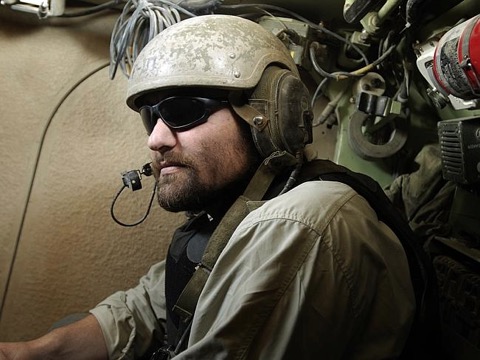
Ware inside an M3 Bradley Cavalry Fighting Vehicle of the 3rd Armored Cavalry Regiment in Iraq. Picture: Franco Pagetti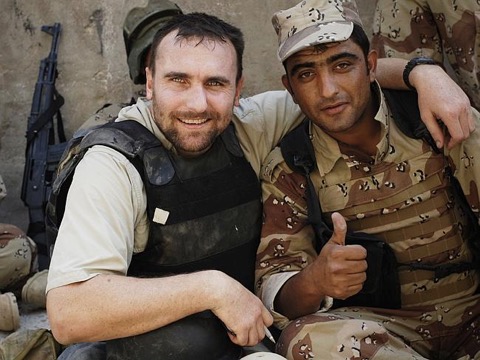
Ware reported from all sides of the war while in Iraq. Picture: Franco Pagetti
War documentaries frequently are, but few of them take the viewer so close to the tip of the spear, where the bullets are flying and men on both sides are being killed.
“Michael Ware was living with al-Qaeda, filming with al-Qaeda and dealing with them on a regular basis,” Only The Dead co-director and Oscar-winning documentary-maker Bill Guttentag says.
“And he was going out with the US into some of the most intense battles. So the film really takes you on this incredible journey.”
“Sometimes people think of documentaries like a trip to the dentist, but this is a very compelling, dramatic story, and there is footage here unlike anything seen before.”
Ware began his journalism career with Brisbane’s The Courier Mail in 1995, later working for Time magazine and CNN.
Time sent him to Iraq in 2003 covering the build-up to the Coalition invasion, its search for weapons of mass destruction and the hunt for Saddam Hussein.
Over the next seven years he remained entrenched in the war-torn country, reporting on its spiral into holy war that would be the genesis of today’s Islamic State regime.
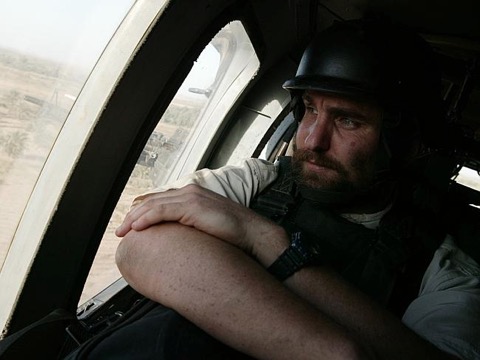
The Aussie journalist worked for TIME magazine and CNN in Iraq. Picture: Yuri Kosyrev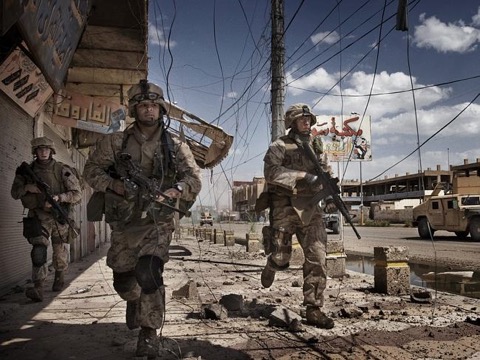
U.S. Marines from the 3rd Battalion, 8th Marine Regiment, Kilo company scan streets and surrounding buildings for insurgents during a patrol in Ramadi. Picture: Yuri Kozyrev
“What I committed myself to in war was the basic fundamentals of journalism; tried and true, gumshoe journalism: endless inquiry and curiosity, persistence and a real passion for stories,” Ware says.
“It’s the things I learnt as a cadet journalist in Brisbane that I applied on the battlefield — wanting to know the truth and knowing that you have to hear all sides of the story.”
“And that’s what compelled me to seek out the other side, because their voice wasn’t being heard and they were the ones being critically misunderstood.”
Ware spent months establishing Iraqi contacts, slowly developing the trust of people who would become the backbone and the brain of the growing insurgency.
“Even if they weren’t still carrying a gun, contact by contact, meeting by meeting, I was able to reach those people who were,” he says.
“It was all a matter of personal relationships and trust that you had to earn.
“What kept me alive was my transparency. What I promised is what I would do, and people needed to know that. Bit by bit they came to understand that and that is what kept me alive and gave me access.”
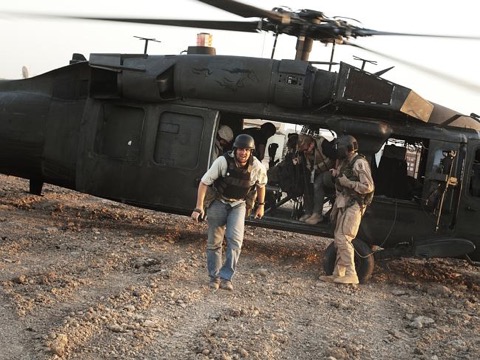
Ware at Camp Liberty Helipad (helicopter landing pad) Iraq in September 2005. Picture: Franco Pagetti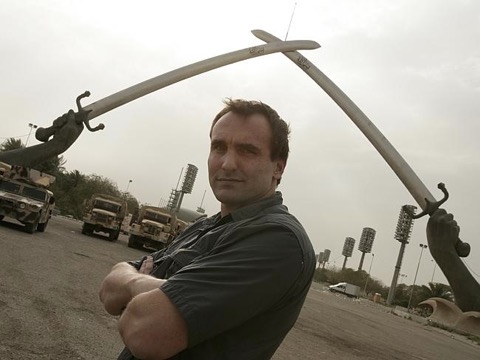
The Victory Arch in Baghdad. Picture: Yuri Kosyrev
“If you had arrived as a journalist to cover the conflict in 2004 or 2005, you wouldn’t have been able to do that because by then that world was closed off to us.
“It was only because I was there from the beginning, and through hard-won personal relationships, that I was able to continue accessing the insurgency and the holy war that followed.”
Ware describes the potential repercussions had he betrayed the trust he worked so hard to earn as “the ultimate letter to the editor”.
“If they ever had a problem with anything I said, or did, or wrote, they were literally able to come and kill me.”
In fact, they almost did.
Ware was kidnapped in September, 2004, on Baghdad’s notorious Haifa Street.
His kidnappers were setting the scene for his videotaped execution when another insurgent with whom Ware had been travelling intervened on his behalf.
It was this kind of frighteningly intimate knowledge of the conflict and its combatants that earned Ware such respect among Coalition forces.
During his time embedded with them, in Fallujah and Ramadi, Ware saw some of the war’s fiercest fighting.
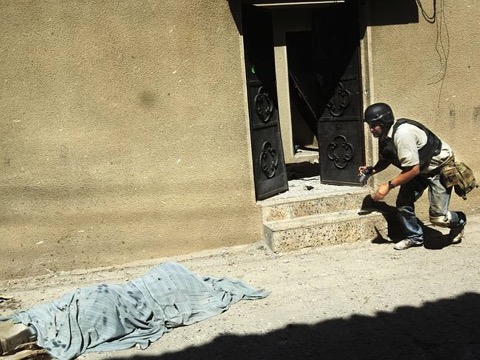
A suspected terrorist lies covered in the street as Ware reports and records. Picture: Franco Pagetti
“One of the things that lured me over and over again into combat was the clarity you find there about yourself,” he says.
“It is terrifying and exhilarating, it’s humbling and uplifting, it’s soul-destroying and it’s life-affirming.”
But venturing into the kill-zone was also simply about Ware’s never-ending quest to get the story.
“Whether you are with our side or their side, the truth lies where the meat meets the metal,” he says.
“The more removed you are from the actual battle, the more the truth can be distorted in propaganda, in exaggeration and in braggadocio.”
“In a war zone, the only way you can know the truth for yourself is to be there when it happens.”
Sgt Bellavia says that even his battle-hardened men were sometimes amazed by Ware’s tenacity.
“I remember him with his back towards enemy machinegun fire and his camera towards the American subjects, and tracer rounds zooming over his head and past his neck,” he says.
“He would just blink hard, keep the camera steady and he was good to go.”
